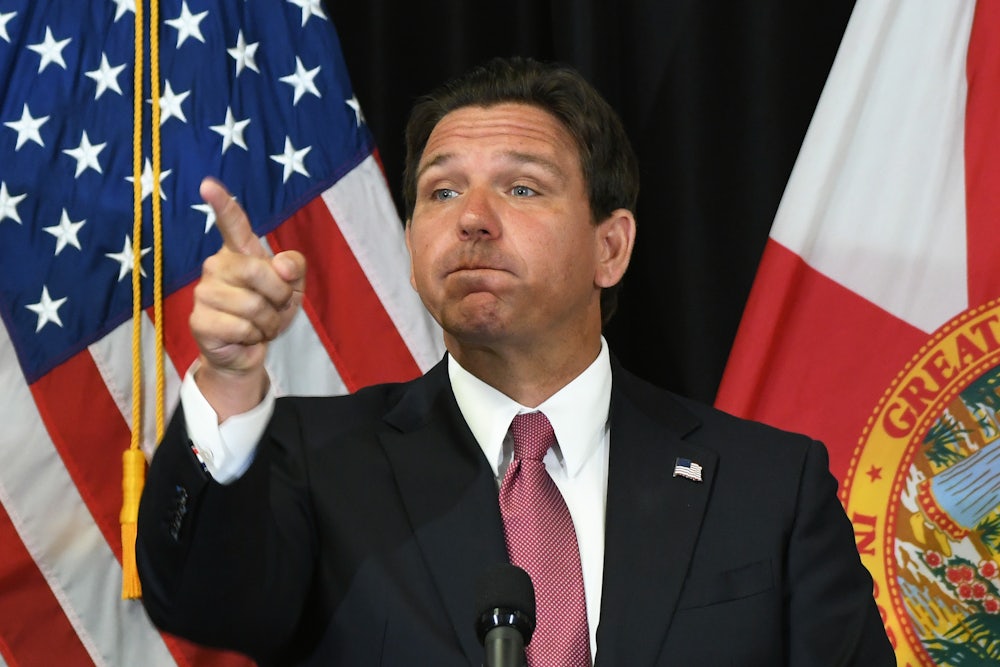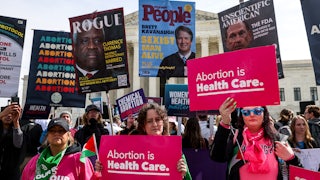When a new abortion ban goes into effect in Florida this week, it will rob people across the South of one of the last few options they had. Floridians and those in neighboring states will instead have to travel to North Carolina or even farther to get an abortion. Abortion funds were already straining to meet the need of patients. Now they must raise more money for people traveling longer distances, later in pregnancy, when abortions can be more complicated and expensive. This is the post-Dobbs reality: For all the optimism surrounding state ballot measures in November, abortions are increasingly out of reach or financially ruinous for large numbers of people.
“This is the biggest change to the abortion access landscape since Roe was overturned,” Stephanie Loraine Piñeiro, executive director of Florida Access Network, told me. “Regardless of what happens in the election cycle, people need abortion access every single day.” As a result of the ban, said Piñeiro, there are clinics that will close and will simply not be able to reopen even if the ban is lifted. “This is being done to further decimate the abortion access landscape in a way that you can’t come back from.”
Whatever happens in November, people in Florida right now are going to need support for the mounting costs and other obstacles involved in going out of state for a surgical abortion, or for navigating the legal risks in obtaining abortion medication. Last year, more than 84,000 people terminated a pregnancy in Florida, according to the state’s health care administration. Abortion funds that help people traveling for surgical abortions have been gearing up. With the six-week ban going into effect, the Tampa Bay Abortion Fund has estimated that at least 90 percent of the people seeking support from the fund will have to go out of state. Florida Access Network has estimated that costs for patients could double—from $1,500 to $3,000. Abortion was previously banned in Florida after 15 weeks, instead of six: The Brigid Fund has reported it helped 195 people from Florida with abortion travel funding in 2023, with an average travel cost of $3,000 each, traveling on average 1,800 miles round trip.
The increased demand on funds, however, may push some to the limits of their budgets and capacity. Florida Access Network was able to give $400,000 to 1,500 people in 2023, including people in neighboring states who had traveled to Florida for an abortion prior to 15 weeks. Nonprofit news organization The 19th has reported that FAN will now direct its funding to people from Florida for out-of-state abortions. Organizations are also fighting to raise more money, but things have changed since the days immediately following the overturning of Roe, when the Tampa Bay Abortion Fund saw “thousands and thousands of dollars pouring in,” the fund’s board member McKenna Kelley told The Guardian. Donors who were moved by the end of Roe seem to have disengaged or moved on. In the hours after Florida’s Supreme Court ruled that the near-total ban was enforceable, Kelley said their fund had only received about $1,000, or enough to pay for one person’s abortion.
The impact of all this will spread far from Florida. In the years since Dobbs, clinics in Florida have also taken in patients from more and more surrounding states: Alabama, Kentucky, Mississippi, Tennessee, Texas, all with near-total abortion bans. Now abortion funds in states even further out are bracing to meet the new need. In 2023, that was about 9,000 people traveling to Florida for an abortion, according to data from the Guttmacher Institute. “When we lose Florida, we just lose this huge lifeline for not just Floridians but for people in the South,” Megan Jeyifo, executive director of the Chicago Abortion Fund, told The Guardian.
The substantial costs of rerouting patients is shared by patients, clinics, and abortion funds across the country. “We expect the forced migration, starting May 1, to overwhelm clinics in North Carolina, Virginia and DC,” Jade Hurley, DCAF’s communications manager, told Salon, “in turn, overwhelming us abortion funds. We just don’t have the dollars, appointments, or capacity to serve everyone who will need us this summer.” Some people from Florida having an abortion after 15 weeks have been traveling to Illinois, the Chicago Abortion Fund has said. It estimates with even more people coming from Florida and from across the South, the fund will need an additional $100,000 each month. More patients traveling to fewer clinics means longer wait times, as the Midwest Access Coalition, an Illinois-based group, told STAT News, with wait times of two or three weeks for appointments that once could be obtained within 24 hours. The longer someone has to wait, the more costly a surgical abortion can be. For abortion funds and for clinics across the United States, even if the ban is repealed, the additional funding they had to raise won’t necessarily be replaced. For people who were stopped from having an abortion, most importantly, there is nothing that could make up for having been deprived of that choice.
Given such lasting consequences, from putting people in thousands of dollars in debt just to travel for an abortion to the stress or trauma of being forced to carry a pregnancy to term, to the possible medical risks, those seeking abortions probably won’t share liberal politicians’ optimism about November ballot measures that are meant to protect or restore the right to abortion. “It was quite personally frustrating,” Tampa Bay Abortion Fund board member Kelley told Axios, earlier this month, seeing people celebrate Florida’s initiative securing a place on the ballot as enforcement of the state’s near-total ban approached.
This is not a new conflict in abortion rights work. The energy and resources that go into electoral campaigns can leave people doing the day-to-day-work of maintaining abortion access feeling like their efforts are just the tragic backstory to fuel some bigger political effort—like the Democratic Party’s hopes of boosting turnout and returning Biden to the White House in November. “We’re seeing glee from so many people, you know, ‘We’re going to have a ballot amendment, Florida’s back in play now!’” Chicago Abortion Fund’s Jeyifo said. “What about the people who are going to be suffering throughout this process? You know, is anyone paying attention to them?”








